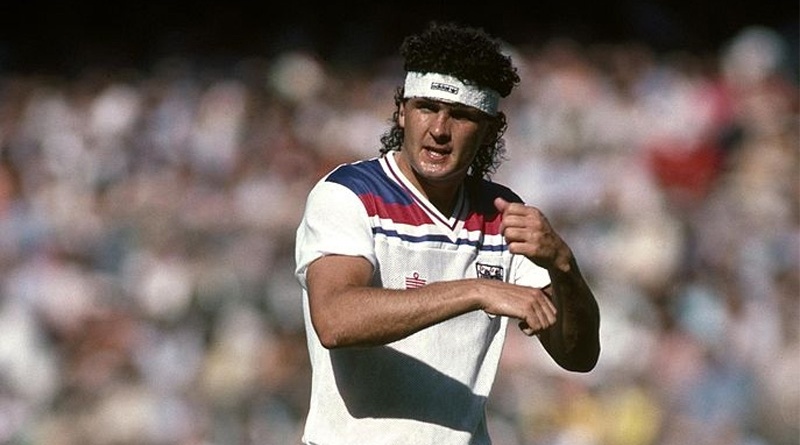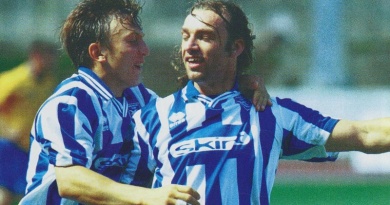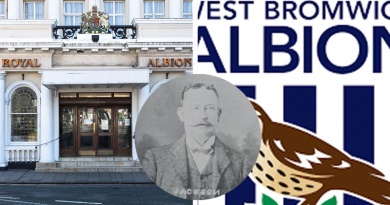Steve Foster 1982: A Brighton player at a World Cup with England
The summer of 1982. War raged over The Falklands, Madness topped the UK album charts and for the only time in Albion history, a Brighton player went to a World Cup with England – Steve Foster.
Foster and the Seagulls had enjoyed an excellent 1981-82 season. Mike Bailey led the Albion to what was their highest ever finish of 13th in the top division until Glow Up Graham eclipsed it in 2021-22, a position achieved largely thanks to Bailey’s defensive tactics. At the heart of this was Foster.
The centre back had been knocking on the door for England selection for the past 18 months. Alan Mullery had first championed his case during the 1980-81 campaign having seen Foster voted as Player of the Season in Brighton’s 1979-80 debut top flight season.
Appointed as Brighton captain at the age of only 23 in the summer of 1981, Foster’s case became impossible to ignore when Brighton went to Southampton on Tuesday 8th December and won 2-0, the first ever Albion win at the Dell.
Andy Ritchie and Steve Gatting got the goals that evening, Mickey Thomas gave a midfield masterclass but it was Foster who was central to the success, ensuring that England’s talisman Kevin Keegan did not have a sniff as Brighton deservedly secured an historic victory. Keegan left the field without a hair on his famous head out of place, so little impact had he had on the game.
Three months later and Foster was given his England debut by manager Ron Greenwood. Tuesday 23rd February 1982 was the date, Wembley was the venue and the final score was a 4-0 victory over a Northern Ireland side featuring his Albion teammate Sammy Nelson.
Bryan Robson, Kevin Keegan, Ray Wilkins and Glenn Hoddle scored that evening. This was a seriously talented group that would be the first England side to go to a World Cup since 1970 – and the first tournament they had actually qualified for since 1962 after hosting in 1966 and being defending champions in 1970. On paper, they looked good enough to win it.
In making his international bow against Norn Iron, Foster became the first Brighton player to start a game for England since Tommy Cook 57 years earlier.
It would be 36 years before another man from the Albion pulled on a Three Lions shirt, Lewis Dunk earning his one and only England cap so far against the United States in November 2018.
Dunk and Foster were similar players. Both were leaders and both were immensely comfortable on the ball. Whilst the modern-day centre back has to be able to do that in the Premier League, Foster was in many ways ahead of his time.
You do not need me to tell you that Dunk not earning more opportunities to play for his country is a source of controversy. Back in 1982, Greenwood calling up Steve Foster for the World Cup was equally controversial and dominated a lot of the talk going into the tournament.
Firstly, Greenwood only named three centre backs in his squad which was a little odd. Foster was selected behind Greenwood’s first choice partnership of Ipswich Town’s Terry Butcher and Phil Thompson of Liverpool.
Secondly, Greenwood tended to favour continuity and experience. Of the 22 players he selected for the 1982 World Cup, 16 had been in his squad for the 1980 European Championships in Italy.
At just 24-years-old, Steve Foster was the second-youngest player after Kenny Sansom and nobody had fewer than the Brighton defender’s two caps, the second of which was earned just a few weeks before the World Cup in a 2-0 friendly victory over the Netherlands. Foster did not fit Greenwood’s normal type.
The biggest problem of all that seemed to surround Foster’s selection was that he had jumped some pretty popular names in the queue to find himself third in line behind Butcher and Thompson for a ticket on the plane to Spain.
Stoke City’s 60-cap defender Dave Watson missed out despite his wealth of experience and years of service. Alvin Martin had starred at centre back the night England beat Hungary 2-0 at Wembley to qualify for the tournament but that was not enough to seal his place.
Harshest done by in being overtaken by Foster was Russell Osman, Butcher’s partner in a Tractor Boys defence which had just finished runners up in the league and won the UEFA Cup under Sir Bobby Robson.
13 years after the 1982 World Cup and Osman would go onto become a Brighton teammate of Foster, playing 17 times for the Albion in the 1995-96 season after Liam Brady brought him to the Goldstone Ground for a five month spell.
It was not just the media, football fans and England defenders who were surprised by Foster’s call up – it came as something of a shock to the player too.
“Playing in the World Cup is what everyone dreams of, they can’t take that away from you. It was a surprise to be included, even though I had played in Wembley friendlies against Northern Ireland and Holland in the months building up to it,” Foster told The News in a 2018 interview about him being the last Portsmouth-born player to go to a World Cup with England.
You only had to look at Foster’s record in the 1981-82 season though to see why Greenwood rated him. As well as shackling Keegan, Foster led Brighton to clean sheets in 1-0 wins away at champions Liverpool and a Spurs side containing the talent of Glenn Hoddle.
The Albion defence also kept out Trevor Brooking when beating West Ham United 1-0 at the Goldstone. Brooking, Hoddle, Keegan and Liverpool in their golden period could not find a way past Foster. That is some record.
For all the focus on the identity of England’s defence going into the tournament, once the Three Lions arrived in Spain it was their attack that ended up letting them down as they departed despite not losing a game.
Only two nations flew through the first group stage with a 100 percent record – England and the thrilling Brazil side of Socrates, Zico and Falcão.
Bryan Robson got things up and running in double-quick time by scoring just 27 seconds into England’s opening game against France.
Gérard Soler levelled things up midway through the first half but Robson again and then Paul Mariner secured a spectacular 3-1 victory against a side who would go onto finish fourth in Spain before winning Euro 84 two years later.
Next up, England faced Czechoslovakia who themselves had finished third at Euro 80. Trevor Francis and an own goal from Jozef Barmoš secured a 2-0 win, inspired by the invention of Hoddle from the bench.
The final group game saw England face Kuwait. With Butcher having been booked against Czechoslovakia, Greenwood decided he did not want to risk being without the Ipswich defender for the second group stage and so Steve Foster got his chance to make history as the first Brighton player to represent England at a World Cup.
A 1-0 win ensured that England topped Group 4 ahead of the French. The Three Lions never really got out of second gear against limited opponents, but nobody could take away from Foster the fact that he had played in an England defence which kept a clean sheet at a World Cup. Francis again got the goal.
The 1982 tournament was the last to use the frankly ridiculous second group stage, for which there was no seeding – meaning that Greenwood and his players received no advantage for their efforts in finishing in first place in Group 4.
Who England faced would therefore be down to the luck of the draw and here, lady luck deserted them. France were rewarded for losing 3-1 to England and finishing second by being drawn in a group alongside Austria and Northern Ireland. England meanwhile were rewarded for their success by facing West Germany and hosts Spain.
A 0-0 draw in stifling Madrid heat against West Germany was followed by the Germans beating Spain 2-1 in their second game. With only the group winners progressing to the semi final, England had to defeat the hosts by two clear goals if they were to make it through to the final four.
Despite being able to introduce both Brooking and Keegan from the bench – both of whom had spent most of the tournament injured up to that point – England could find no way past Spain and it ended 0-0.
The Three Lions were unbeaten in five matches, had only conceded once and yet they were heading home. Italy would go onto beat West Germany in the final to claim their third World Cup.
For Greenwood, it was the end of his reign as manager. Only seven members of the 1982 World Cup squad went to a major tournament with England again.
For Foster, his cap against Kuwait proved to be his last appearance for England. Like Dunk, he should have been given more opportunities to represent his country, even as Brighton were relegated from Division One a year later.
“It was very disappointing to go out how we did, but you need to score goals and we failed to do that,” Foster later said. “England went out undefeated, while I never played for my country again – but I was still happy with those three caps. It was a fantastic experience.”




